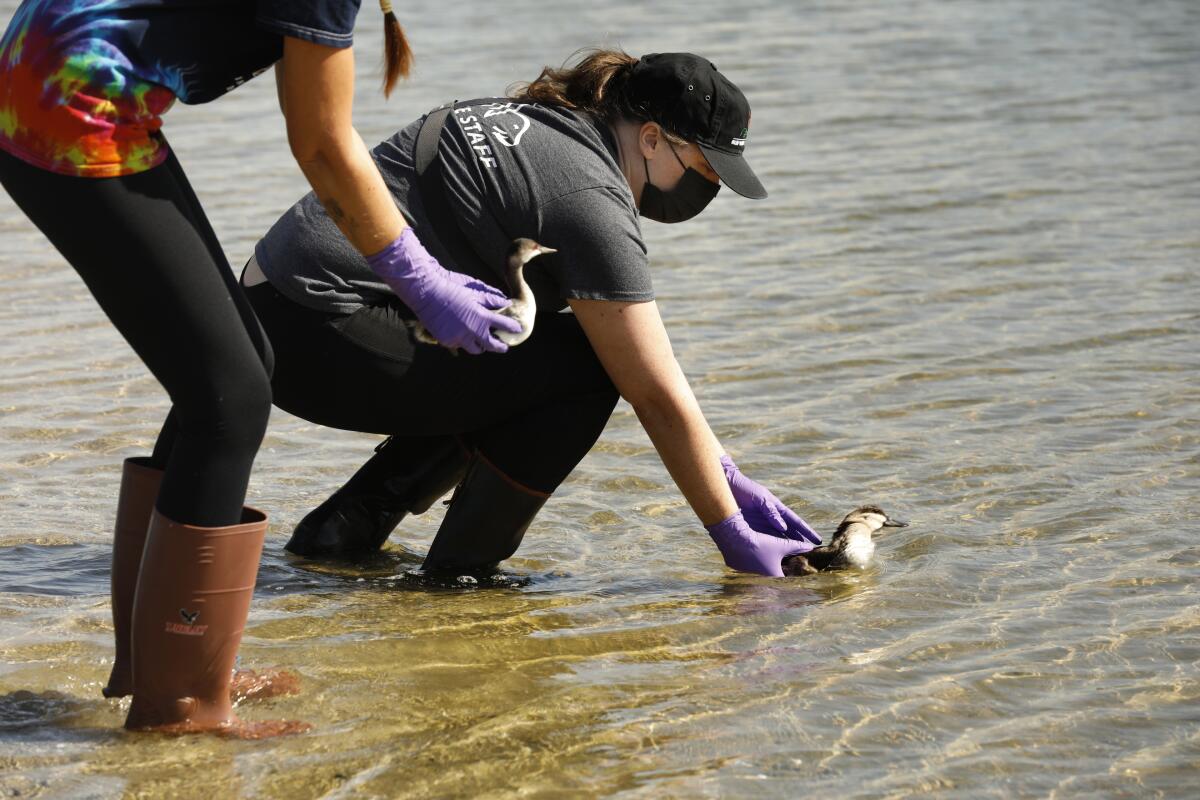Cleansed of oil, birds harmed by O.C. spill take flight in Huntington Beach

- Share via
On Oct. 3, the first winged victim of the Orange County oil spill washed ashore in Newport Beach. Its white and light-brown feathers were caked with black crude. Cold, oily water had seeped through its down and onto its skin.
Ten days later, Sam Christie, a wildlife care specialist from the UC Davis Oiled Wildlife Care Network, lifted the bird — a ruddy duck — from a soft, blue box and placed it at the edge of Huntington Harbour. Healthy and cleaned of oil, it did as ducks do; it glided across the surface of the water, paddling its feet and bobbing its head.
“Birds don’t ever do anything to say ‘thank you,’” Christie said after the send-off Wednesday morning. “They hate us, and they are terrified of us, and they are stressed out the whole time. They don’t know that we’re helping them. So this is the only thanks we get, is just seeing them leave us in good health.”
As of Tuesday evening, wildlife officials had collected 28 oil-covered birds from the Orange County shoreline, all of which have undergone cleaning and rehabilitation with experts from the Oiled Wildlife Care Network. According to director Dr. Michael Ziccardi, six of those birds have since died or been euthanized.
“Other animals are doing very well in rehabilitation,” Ziccardi said. “We’re never going to have absolute assurance of all of those animals’ surviving to release, but they’re looking very good.”
Back at the harbor, another small waterbird — an eared grebe — was released alongside the ruddy duck Wednesday. It took flight as soon as it touched the water.
The two birds had spent several days rehabilitating together in an outdoor pool at a primary care center in San Pedro. They ate live insects and dead fish while experts monitored their health and ensured their feathers were free not just of oil but also of soap.
The tight alignment of a bird’s feathers allows it to stay warm, buoyant and dry, Christie said. Oil disrupts that structure, leaving a bird chilly and waterlogged. Though a cocktail of solvent, dish soap and warm water removes the oil, it also prevents the feathers from properly realigning, causing the same problems that oil does. “Whatever we put on them, we have to keep off,” Christie said.
Christie, who has responded to dozens of oil spills in her career, was at work when the ruddy duck she released into the wild Wednesday first arrived at the facility for care. It had 150 grams of crude oil adhered to its feathers — about one-third of its total body weight.
Oil wreaks havoc on a bird’s system, causing it to “waste away,” Ziccardi said in an interview. Weighted down by oil and cold water, a bird has to expend more energy to fly, float and maintain its body temperature at 103 degrees. Unable to do so, a bird will beach itself in an attempt to stay warm. But its food is in the water.
“They can’t eat,” Ziccardi said. “It’s really a vicious cycle.”
In addition to the 28 living birds collected by Ziccardi’s team, 45 birds have come to experts dead on arrival. Ziccardi said “a subset” of those birds were visibly oiled.
“They don’t all make it unfortunately,” Christie said. “They have a lot to contend with. And we do our best. But the ones that do make it are survivors, and that’s pretty incredible.”
Among the survivors are seven federally threatened western snowy plovers, which were collected from Huntington Beach and Newport Beach in the early days of the spill. The birds are now clean of oil, and experts have observed them eating insects and preening their feathers as they prepare to return to the wild.
It is too early to determine the long-term effects of the Orange County oil spill on the region’s sensitive habitats and wildlife, said Laird Henkel, senior environmental scientist with the California Department of Fish and Wildlife’s Office of Spill Prevention and Response.
But one thing is clear: By the time the response wraps up, “the environment should be cleaned back to the baseline level,” Henkel said. “There shouldn’t be any residual oil left here that would impact birds later.”
All the latest on Orange County from Orange County.
Get our free TimesOC newsletter.
You may occasionally receive promotional content from the Daily Pilot.




